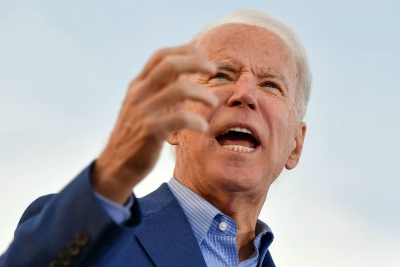WASHINGTON — On Joe Biden’s first day as president, he plans to launch a task force to reunite children and parents separated at the country’s southern border.

Democratic presidential candidate Joe Biden at a campaign rally in Kansas City on March 7, 2020. (Mandel Ngan/AFP/Getty)
It’s one of several ways Biden has vowed to reverse policies put in place by President Donald Trump. But on other issues important to American Jews, change may come slower, or not at all.
Anti-Semitism
Biden wants to develop a “comprehensive approach” to combat anti-Semitism, in consultation with the Jewish community. Trump cut some programs tracking extreme right domestic terrorists; Biden said he will restart them.
Trump last year signed an executive order recognizing Jews as a protected class deserving of civil rights protections. The order used as its definition of anti-Semitism the International Holocaust Remembrance Alliance definition.
The order has already resulted in Education Department investigations of extreme anti-Israel activity on campus.
Some Democrats embrace the IHRA definition.
The Biden campaign has not said what its plans are for the executive order.
Immigration
Immigration policy carries emotional weight for many Jewish Americans who are mindful of their own ancestors having been refugees — and of the devastating toll that most of the world’s refusal to accept refugees caused for Jews during the Holocaust.
Trump reduced refugee admission. Biden has vowed to dramatically increase refugee admissions.
Iran
Biden has faulted Trump for exiting the Iran nuclear deal. Trump said the deal, which exchanged sanctions relief for a rollback of Iran’s nuclear capability, was too generous, not enforced and contained a sunset provision.
Israel’s Netanyahu government was in agreement with Trump.
The deal was brokered by President Barack Obama, and Biden helped sell it, though Congress was never given the opportunity to vote on it.
Trump’s withdrawal angered European partners to the deal and has pushed Iran’s economy to the brink of collapse.
Since the US pullout, Iran has accelerated its nuclear development, blaming the US for violating the deal; and has also focused on its development of long-range missles capable of hitting Israel and even Europe.
Biden wants back in because he wants to repair ties with Europe, and believes the deal is the best means of keeping Iran from obtaining a nuclear weapon.
He has said he wants to make it stricter, extending the “sunset clauses,” which allow Iran to wind down some of the restrictions.
Not so clear is whether Biden would want restrictions on Iran’s missile program and its regional adventurism rolled into a renewed deal.
The Abraham Accords
Biden says he wants to achieve comity with Republicans. “It’s time for America to unite and to heal,” was his first post-announcement statement. He’s reportedly got a few Republicans in mind for his Cabinet.
One way that his commitment to bipartisanship will play out in his Middle East policy is in the Abraham Accords, the normalization agreements brokered by Trump between Israel and the United Arab Emirates, Sudan and Bahrain.
Biden has said he likes the accords.
So should we expect more of the same? Perhaps. Other Arab countries that have long had unofficial ties with Israel, including Oman and Morocco, might announce even before the inauguration.
The big fish, however, is Saudi Arabia. It will likely want the carrot that the UAE has secured, a major arms deal; Trump has cajoled Israel into not objecting to the sale of stealth combat jets to the Emirates.
Democrats are unhappy about the sale, and that unhappiness would grow with any proposed arms sale to Saudi Arabia.
Democrats object to the devastating war Saudi Arabia is conducting in Yemen and have not forgotten the kingdom’s role in the murder of journalist Jamal Khashoggi.
For Democrats, enticement of Saudi Arabia to make peace with Israel is not their highest priority regarding Saudi Arabia.
The Deal of the Century
In January, Trump rolled out the Israeli-Palestinian peace proposal he had touted for three years. One component of the deal that would come off the table with a Biden presidency would be the eventual partial Israeli annexation of West Bank territory.
Even in that instance, though, there’s not much practical different between Trump and Biden: The Trump team told Benjamin Netanyahu he needed Palestinian buy-in to the peace plan before annexing territory, which did not happen.
Biden will reinstitute the emphasis on the two-state outcome as an endgame, but don’t expect a major push for peace from his White House.
Biden will have on his foreign policy team plenty of Obama veterans and they feel burned by their two failures (2010-2011 and 2013-2014) to get to a deal.
At the same time, Biden will be under pressure from his progressive left to reassert the Palestinian issue as the key to peace in the Middle East.
The Trump recognitions
Trump recognized Jerusalem as Israel’s capital and moved the US Embassy to the city. He also recognized Israeli sovereignty over the Golan Heights, from which Syria bombarded Israeli farms below before Israel captured the Heights from Syria during the 1967 Six Day War.
Biden has said that Trump’s Jerusalem recognition was ill-timed, absent an Israeli-Palestinian deal, but has also said he would not reverse it.
The predicted wave of violence throughout the Arab world in response to the Trump recognitions did not occur.
Biden has not commented on the Golan, but with Syria still convulsed in violence and instability even as its civil war dies down, don’t expect any dramatic Biden action in this area. Biden has suggested that Trump was too accommodating of the Assad regime, so he’s not about to hand the same regime a plum.
Aid to Israel
During the primaries, some Democratic candidates spoke of conditioning defense to Israel on its behavior; Biden repeatedly rejected that proposal. He intervened to keep the word “occupation” out of the Democratic platform.
The Palestinians
Biden has said he will reestablish the ties with the Palestinians. Expect a return of the PLO envoy to Washington and a reopening of the Jerusalem consulate that deals specifically with Palestinians — Trump wrapped its functions into the embassy.
Biden has also said he would resume the assistance to the Palestinians that Trump cut off, in accordance with American law that bans funding for the Palestinian Authority as long as it pays salaries to Palestinian terrorists and their families for murdering Israelis or American citizens.
One such American was Taylor Force, 25, who was murdered while visiting Israel, and after whom the American law is named.
It still leaves Biden some leeway; he could direct funds to NGOs that operate separately from the PA, and to UNRWA, the UN agency that administers relief to the Palestinians.
















